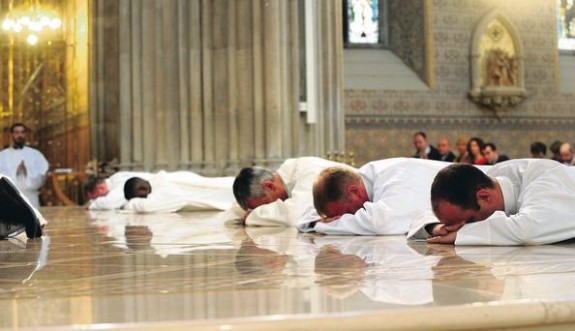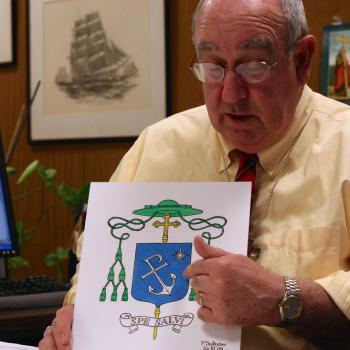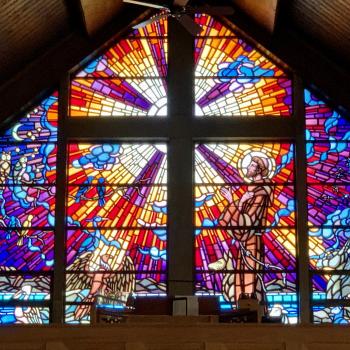Over at his blog, Deacons Today, Bill Ditewig unpacks the recent controversy surrounding the UK’s Deacon Nick Donnelly, and takes a closer look at the relationship between a deacon and his bishop,
He also makes clear why the work of blogging clergy is fundamentally different than that of the laity.
Take it away, Bill:
Concerning the notion of obedience, this is no mere profession of blind obedience to the bishop, nor is it simply a legal requirement to preserve good order and discipline. Holy Orders, as we are told repeatedly in Vatican documents on the diaconate and the priesthood, is at its core about relationships: the relationship of the ordained with Christ, the relationship of the clergy with their bishop, for example, and the relationship of the clergy with the people we serve, or with each other. Ordination is not simply about the individual being ordained, but is actually about the entire Church. For example, it is often helpful to state that a person is not ordained “a deacon” or “a priest”; rather, he is ordained into the Order of Deacons or into the Order of Presbyters. We never operate alone: we are called into a community of service. Therefore, obedience sets the standard for this community. Obedience, in its theological roots, refers to listening and hearing (Latin: ob + audire) the Word of God through the power of the Holy Spirit working through others, and in the case of ordination, that means recognizing the Holy Spirit working through the bishop. It acknowledges in humility that the ordinand recognizes that, through the Bishop’s own ordination into the Order of Bishops, he has received the Holy Spirit in a unique way, the same Holy Spirit he is about to invoke upon the ordinand. The “promise of obedience” then is a profound theological as well as legal moment of that new relationship. Both our theology and consequently our law abhors the notion of a “vagus” cleric: an “unattached” cleric who is not incardinated somewhere, a cleric who is not somehow attached to a particular Church and exercising ministry under the “oversight” (episkopē” in Greek) of a bishop or other legitimate ecclesiastical superior.
The deacon in the current situation is member of the diocesan clergy, bound by his promise of obedience to his bishop. Someone asked about Deacon Greg Kandra and his famous “Deacon’s Bench” blog: yes, if Greg’s bishop were to decide that Greg should no longer host his blog, he would be expected to give it up. As clergy, we surrender a certain amount of freedom which lay people would have in a similar situation. According to Vatican II’s Dogmatic Constitution on the Church (Lumen gentium), #18, all clergy exist for one reason: to build up the Body of Christ. It is one of the responsibilities of the diocesan bishop to assess this “on the ground” and to make determinations about the building up of the Body of Christ in his own diocese. As clergy, we are public persons. As such, we cannot really say that “in this activity I am operating as a private person” with regard to the church. We give that ability up upon ordination. We now represent Christ and we also represent the Church. St. Thomas Aquinas famously taught that a cleric acts “in persona Christi et in nomine ecclesiae” (“in the person of Christ and in the name of the Church”).
Cardinal Dolan, in a recent talk at Rome’s University of Santa Croce during a conference on communications, pointed out that we must “adhere to the best and highest standards. . . . How we say something is just as important as what we say.” In this observation he is echoing St. John XXIII, who frequently spoke of the permanence of religious truth on the one hand, and the ways in which those truths are expressed on the other. How we communicate is just as important as the content of what we have to say. As a screenwriter once put it, “Is coarseness a substitute for wit, I ask myself?” Truth is one thing; a Christian should be communicating that truth in a Christian manner; there is no room for “snarkiness”, demeaning characterizations, ad hominem arguments or anything of the like. This is so much more than just “being nice” to others. For clergy in particular, it is about doing what “builds up” the Body, not acting in a manner which derides and tears down the Body. That’s really the gold standard: When I write, when I speak, am I building up the Body of Christ, or serving to tear it down?
If we are not building up the Body, and we are clergy, then it is the obligation of our bishop or religious superior to take corrective action on behalf of the diocesan church. So, when we come across a blog hosted by a member of the Catholic clergy, consider the following points:
1) How well is the cleric in question reflecting a positive, constructive, and energetic vision of the Church? If the blog is characterized by negative, hand-wringing, woe-is-me attitudes about the Church, find another blog to visit!
2) How does the cleric communicate, especially about others with whom he may disagree? For example, Cardinal Dolan stressed the importance of “never caricaturing or stereotyping those who oppose the Magisterium and bishops at every opportunity.” Even in the face of “mean, vicious, and outward attacks,” he said, we must “always respond in charity and love,” he exhorted. “We follow the instruction of Jesus by not responding back to with harsh words of our own.” The use of demeaning, sarcastic and mocking language has no place in Christian communication, especially by members of the clergy, and the cleric should be rightly taken to task if this is part of his communication “style”; it’s simply not consistent with being Christ-like in the community. If you find this on a blog supposedly run by a Catholic cleric, find another one!
3) As public ministers of the Church, no member of the clergy should be reticent about being transparent and accountable about his own ecclesiastical “credentials”: who is his ecclesiastical superior, for example, and how does his blog relate to his overall ministry within the broader communion of the Church? Obviously, I’m not suggesting disclosing information which might be dangerous to his safety, but certainly his public identity as a cleric in a particular religious community or diocesan church is not unreasonable. If a cleric is unwilling or unable to provide such bona fides, it will probably be better to visit someone else!
There’s much more, with ample food for thought. Read it all.












